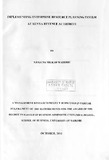| dc.description.abstract | This study sought to determine factors influencing implementation of the ERP system AT KRA. The study was conducted using a descriptive case study design. It was based on four heads of departments; Human Resource department, Finance department, Procurement and Supplies department and leT department. Primary data was collected using an interview and a content analysis was used to analyze the data. The study established that computer based information systems used prior to introduction of .ERP system. Several reasons justified the implementation of ERP systems. In the implementation methodology, the respondents selected the Module by module, big-bang approach and customized approaches.
There was a formal process of analysing the users of the system before the implementation commenced. The implementation and steering committee was responsible for making necessary adjustments on ERP system. The main considerations for choosing ERP system were found to be cost effectiveness, licenses involved and user-friendly technology. The study ascertained that most of the projects whose implementation was not completed in time were found to be stretching to more than three months after the scheduled time and the actual budget exceeded the planned budget and the general outcome of the implementation project was below the original expectations.
There were two main impediments to the implementation of ERP System; the users and the management. The users had gone for various retreats to come up with various processes, given the feedback received from users about ERP System implementation, of which resistance to change and manual methods preference to ERP was evident. The study found out that efficiency of the system had blocked the loop holes that existed in the manual process while some staff found themselves with lesser work. Sadly, implementation of the ERP was not on track especially due to contract conflict between the company and the consultants and was not carried out in the most effective way. However, the implementation could be improved with better understanding of all stakeholders. | en_ |

